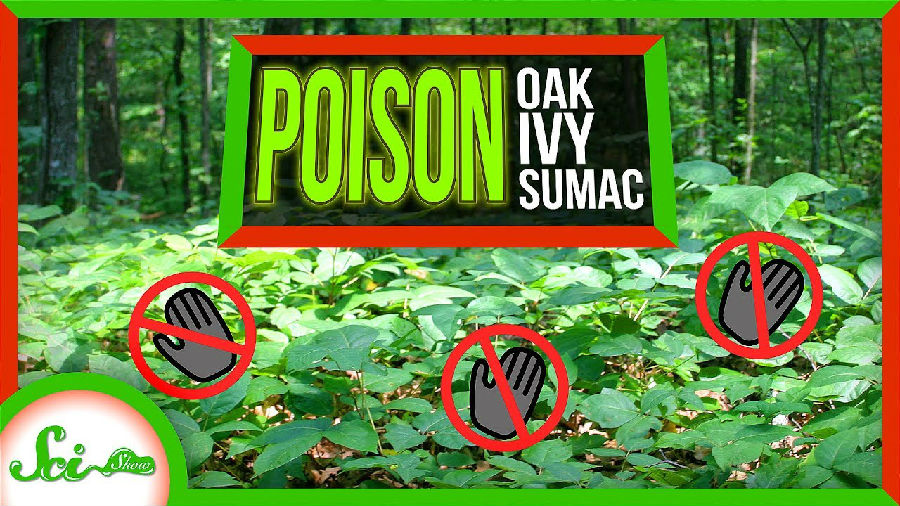(单词翻译:单击)
Nothing can ruin your vacation quite like an encounter with one of nature's purveyors of itchiness.
没有什么比偶遇大自然的瘙痒制造者更能破坏你的假期了。
Of course, I'm talking about poison oak, poison ivy, poison sumac, and their notorious relatives.
当然,我说的是毒葛、毒常春藤、毒漆树以及它们臭名昭著的亲戚。
Yes, these botanical nightmares are clearly out to make camping and hiking as miserable as possible. But maybe they're not?
是的,这些植物噩梦的出现显然是为了让露营和徒步旅行尽可能的痛苦。但万一不是呢?
Maybe they were just hanging out in the forest, enjoying the fresh air,
或许它们只是在森林里闲逛,享受新鲜空气,
and trying to keep harmful microbes at bay, until you and your over-eager immune system happened to come along.
并试图阻止有害微生物,直到你和你过度热切的免疫系统碰巧出现。
Poison ivy and the like are innocent. These plants all produce an oily resin called urushiol.
毒常春藤等是无辜的。这些植物都产生一种叫做漆酚的油性树脂。
And it isn't just in their leaves; it's in every part of them. And it remains even after the plant has died.
这种物质不仅在它们的叶子里,它们无处不在,它甚至在植物死亡后仍然存在。
This urushiol is what causes that notorious itchy rash you get, or, what doctors call "urushiol-induced contact dermatitis."
正是这种漆酚导致了你身上那种出了名的痒疹,或者医生所说的“漆酚引发的接触性皮炎”。
Now, the leaves have to be crushed or somehow damaged in order for the urushiol to actually contact your skin,
为了让漆酚真正接触到你的皮肤,树叶必须被压碎或以某种方式破损,
so you won't get it by just touching the plant.
所以触摸植物是不会起疹子的。
Of course, leaves and such are easily damaged by insects, passing animals, or a stiff breeze,
当然,树叶之类的东西很容易被昆虫、路过的动物或烈风破损,
so just because you didn't damage the leaves yourself doesn't mean something else didn't get there first.
所以你没有破坏树叶并不代表其他东西不会在你之前损坏它们。
In fact, because urushiol causes such a violent rash in people,
事实上,因为因为漆酚会在人身上引起剧烈的皮疹
there's this pervasive idea that the resin evolved as a defense mechanism against large mammals like us. But that's not true.
有一种普遍的观点认为,树脂是作为一种防御机制而进化,用来对抗像我们这样的大型哺乳动物的。但并非如此。
Or at least, if it was a defense mechanism, it would be a really lousy one,
或者至少,如果这是一种防御机制,那将是一个非常糟糕的机制,
since urushiol doesn't bother most animals that encounter it. Just us and apparently, hamsters.
因为漆酚并不会打扰大多数遇到它的动物。只有我们和仓鼠。
But it has no effect on the animals that actually feed on the plant, like deer, insects, and birds.
但它对以这种植物为食的动物没有影响,比如鹿、昆虫和鸟类。
That's why scientists think it's more likely that urushiol evolved as an antimicrobial,
因此,科学家们认为更有可能的是,漆酚是一种抗菌剂,
it's quite effective against much smaller plant pests.
它对更小的植物害虫非常有效。
There's even been some speculation that birds that eat the seeds actually benefit
甚至有人猜测,吃了种子的鸟类实际上
from urushiol's antimicrobial and anti-parasitic properties.
受益于漆酚的抗菌和抗寄生虫的特性。
It's simply an unfortunate accident of evolution that makes these plants incompatible with humans.
这只是进化的一个不幸的意外,使得这些植物与人类不相容。

So, the rash, oozing blisters, and relentless itching, it's all pretty much down to cosmic unfairness.
因此,皮疹、水泡和持续的瘙痒,几乎都是由于宇宙的不公平。
Urushiol interacts with your skin cells; specifically, ones that express a protein called CD1a.
漆酚与皮肤细胞相互作用;尤其是那些表达CD1a的蛋白质。
CD1 proteins help the body spot invaders and sick cells.
CD1蛋白质帮助身体识别入侵者和患病细胞。
They bind to specific fats, then show those fats to the body's immune cells.
它们与特定的脂肪结合,然后将这些脂肪展示给身体的免疫细胞。
Except, human CD1a has the unfortunate tendency to set off attacks in response to things that aren't pathogenic.
除此之外,人类CD1a有一种不幸的倾向,即对非致病性的事物进行攻击。
And it just so happens urushiol is one of those things.
而漆酚就是其中之一。
Urushiol-loaded cells activate the body's T cells, those vigilant warriors of the human immune system.
载有漆酚的细胞激活了身体的T细胞—人类免疫系统的警惕勇士。
Then the T-cells release two proteins called interleukin 17 and interleukin 22, and they're what make you itch.
然后T细胞释放两个蛋白质—白介素17和白介素22,并且就是它们让你发痒。
The redness, swelling, and blisters all occur because your immune system harms your skin cells
红肿和水疱都是因为你的免疫系统试图消灭一点无害的油脂
in its attempts to eradicate a bit of harmless oil.
而伤害了你的皮肤细胞。
Now of course, this doesn't really apply to those 10-15% of humans who don't seem to be affected by urushiol at all.
当然,这并不适用于那些10-15%似乎完全不受漆酚影响的人。
For some reason, nature has seen fit to spare some people from the horrors of urushiol,
出于一些原因,自然界似乎已经将一些人从漆酚的恐怖中解救了出来,
but there hasn't been a lot of scientific research into why that is.
但是没有很多科学研究来解释为什么会这样。
It might be because urushiol-induced contact dermatitis is basically an allergy.
这或许是因为漆酚引起的接触性皮炎基本上就是一种过敏。
And allergies occur when the body mistakes a harmless substance for something harmful.
当人体将无害物质误认为有害物质时,就会过敏。
And like with other allergies, some people's immune systems just go haywire when encountering urushiol while others' don't.
和其他过敏一样,一些人的免疫系统在遇上漆酚时会失控,而一些人的则不会。
It's just that most people are allergic to urushiol. But also, some of the people who say they're immune probably aren't really immune.
只是大多数人都对漆酚过敏。但是,说他们有免疫力的人,可能并不是真的有免疫力。
Most people don't react to urushiol the first time they're exposed,
大部分人在第一次接触漆酚没有反应,
so a person might believe they're immune when, in fact, they could go on to develop an allergic reaction if they touch it again.
因此他们或许认为自己有免疫力,但事实上,如果他们再碰它,就会产生过敏反应
And even if they've had a couple of exposures with no reaction, they could still develop a sensitivity later in life.
即使他们有过几次没有反应的接触,他们在以后的生活中仍然会有敏感性。
And increased exposure is thought to increase the likelihood of developing sensitivity.
接触次数增加被认为可以增加敏感性的可能性。
So if they roll around in a bunch of poison ivy to show off to their hyper-allergic friends,
所以如果他们在一堆毒常春藤中打滚,向他们极度过敏的朋友炫耀
they might end up experiencing some itchy, itchy karma.
他们可能最终会经历一些发痒的报应。
Though, weirdly enough, sometimes sensitivity to urushiol fades as people get older.
奇怪的是,随着年龄的增长,人们对漆酚的敏感性也会逐渐减弱。
Scientists aren't really sure why, but it might have something to do with the fact that your immune system weakens as you get older.
科学家并不确定其中原因,但这或许和人类免疫系统岁年龄增长而减弱有关。
And a weaker immune system may not mount as strong a defense against urushiol. So that's one advantage to getting older!
脆弱的免疫系统可能无法对漆酚形成强大的防御。这是变老的一个好处。
At any rate, whether you think you're immune or not, or may have become less sensitive over time,
无论如何,不管你是否认为自己有免疫力,或者随着时间的推移变得不那么敏感,
you probably don't want to push your luck. Urushiol-induced contact dermatitis is miserable at any age.
你可能并不想碰运气。漆酚引起的接触性皮炎对任何年龄的人都是痛苦的。
So it's always a good idea to avoid whichever version of poison-whatever is in your neighborhood.
所以避免任何一种有毒物质总是一个好主意——无论你的院子里有什么。
If you want to learn more about the quirks of human immune systems,
如果你想了解更多关于人类免疫系统的怪癖,
you might like our episode on how having parasites could actually be good for you.
你可能会喜欢我们这期关于寄生虫如何对你有好处的节目。
And of course before you go, be sure to click that subscribe button and ring the notification bell!
当然结束前,请一定要点击订阅和通知按钮!


